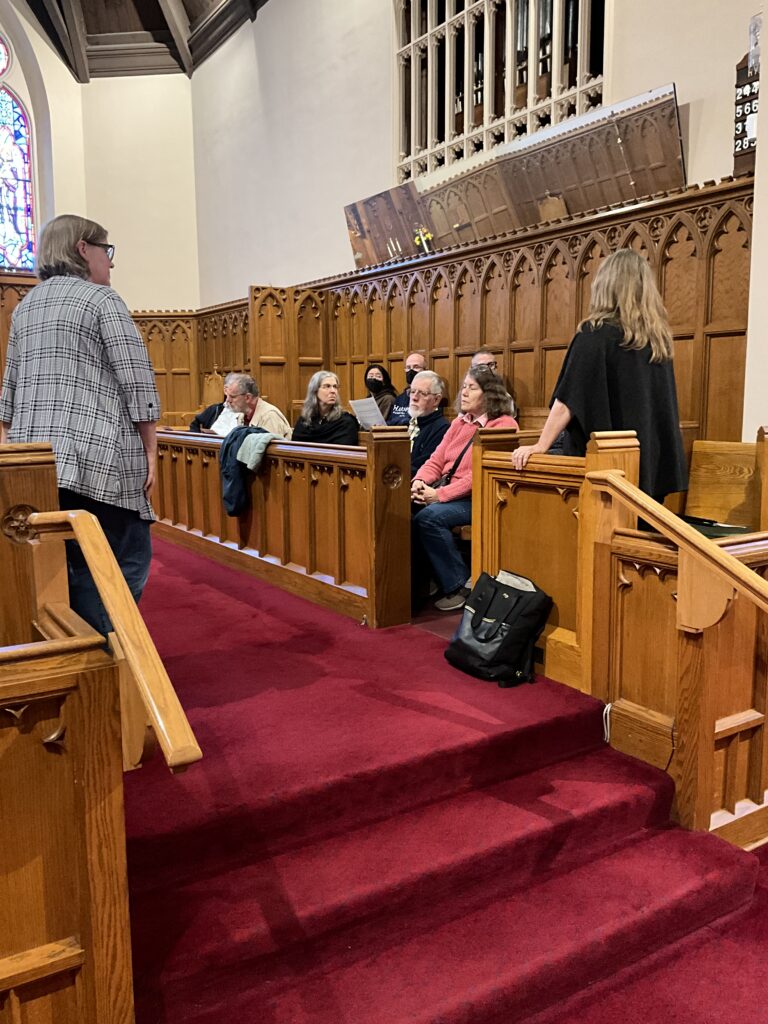When I arrived at Pacific Lutheran University, I knew I had the opportunity of a lifetime. I was going to get to play Paul Fritts & Co. Opus 18, a truly magnificent instrument, almost every day of the week. I wanted to make sure that I took the time to learn the sounds of the instrument, to learn beautiful stop combinations for my own performances and to support guest artists. I thought it would be both fun and educational to make a project out of exploring the organ’s tonal palette, and I decided to use the Görlitz Organ Tablature to help me on my journey of discovery.
The Görlitzer Tabulaturbuch, as it is known in German, is a collection of 100 Lutheran chorale melodies harmonized in four voices by Samuel Scheidt (1587–1654), one of Sweelinck’s most well-known students. He was commissioned by the city of Görlitz to create these harmonizations, which Scheidt intended for organists to use and learn from in services and private devotion. They are miniature masterpieces of early Baroque counterpoint, often employing advanced chromaticism; we might compare them favorably to J.S. Bach’s collection of Lutheran chorales that represent the developments of the Late Baroque.
The Fritts organ is especially well-suited to playing music of the North German Baroque, so it felt like a good fit to use Scheidt’s music to explore the instrument’s timbral resources. The combination of many tunes for different seasons of the church year combined with their short length made the collection even more attractive to me. I knew that the scope of this task, registering 111 unique harmonization of 100 chorales, would stretch my thinking about combining stops to beautiful musical effect.
At first, I followed my education in Baroque registration practice. I relied especially on Barbara Owen’s fabulous resource The Registration of Baroque Organ Music, which I had picked up in college. I explored each of the divisions’ principal choruses, their individual flute stops, and the reeds on their own. Once I had exhausted single registers, I was confronted by the many possibilities of combining stops. I considered historical principles, but most often I tried to match the tone of the hymn to the sound of the stops: this principle helped inspire me when I had already employed obvious combinations. Later in the project, I allowed myself to start thinking outside the box, employing ideas more suited to Romantic or even modern styles to see how far I could stretch the organ’s tonal possibilities.
I learned that the reed stops on this particular instrument are its greatest resource. Using reed stops in combination with principals, flutes, mixtures, and other reeds expanded my thinking about how they can be used as an alternative foundation for chorus registrations. By combining many stops at matching pitch levels, I learned important lessons for creatively registering music from the 1800s and 1900s that I will be able to employ in future performances. It was certainly a challenge to find over 100 sonically distinct registrations, and there were times that I used multiple harmonizations to show off the same registration on different divisions. I learned so much about the different qualities of the same stop on the Swell as compared with the Positive and the Great. That point seems obvious, but being attentive to the differences will certainly help me make creative choices in the future when adapting music that may require some deviation from the written directions.
I am sure that many of us have worked through the stops of a new instrument to learn how to make it sound its best; however, I wanted to share my experience as a way to encourage us to take more time with instruments we know, to discover tonal possibilities that may not be immediately obvious. It was important in this case to face the challenge of devising more than just a few ordinary combinations, as I learned a lot more about how stops best like to be combined in specific circumstances.
I am not quite done (I will reach the finish line at the end of the church year on Christ the King Sunday), but I know the project has already reshaped my thinking about registration—I am a much more flexible thinker, and I am willing to think outside the box if a specific effect will make an exciting sound. I can now better combine my knowledge of registration traditions with the immediate need to register music with a specific instrument’s resources. I also had a lot of fun learning many Lutheran chorale tunes that are no longer commonly used in worship and discovering some very idiosyncratic takes on familiar melodies.
You can hear my registration journey through this YouTube playlist: https://youtube.com/playlist?list=PLjRr8YZiHEj_s1zPGoBc2SysMg7-lemBc&si=t604v9roGAPCev0s.



